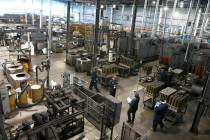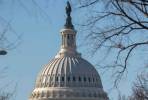Institute proposes service tax
You don't pay a sales tax on haircuts, dry-cleaning, child care or landscaping maintenance.
But a new proposal would change that, imposing a transaction levy not just on tangible goods, but on services.
The plan, which free-market think tank Nevada Policy Research Institute released in June, calls for eliminating the state's payroll tax, which ranges from 0.5 percent to 1.17 percent of payroll depending on revenue, while cutting the state's base sales-tax rate from 6.85 percent to 3.5 percent. That 3.5 percent tax would then apply to intangible services. The service tax wouldn't apply to business-to-business transactions.
Local companies asked about the plan this week seemed unsure that the proposal would benefit them.
Put Cristina Vito, administrator of Nevada Adult Day Healthcare Centers in Las Vegas, in the thumbs-up camp.
The company employs nearly 50 workers, so dumping the payroll tax would be a plus, Vito said.
Nor would a 3.5 percent tax on top of what the business already charges for a day of care be too onerous for her private-paying clients.
"If you look at it, it should be OK. I don't think I'll have any clients grieving over it," Vito said.
Ron Marino is a little less sanguine about the idea.
As general manager of Vegas Valley Air Duct, Marino sees intense price sensitivity among his customers these days. His business is already down 80 percent in the recession; an added burden on consumers could push the business over the edge.
"If they put any tax on services, it would be a terrible, detrimental thing. We're already down as much as we can be without going out of business. This could just pivot it over into closing," Marino said.
Geoffrey Lawrence, the Nevada Policy Research Institute fiscal analyst who developed the plan, admitted the group's idea has received "mixed" reviews, partly because people mistakenly assume it's a tax increase.
"There's been a lot of misunderstanding about what's included," Lawrence said. "People who have actually read (the report) had much more positive feedback."
The institute's proposal is designed to be revenue-neutral, which means it's not supposed to increase or decrease tax collections.
Rather, the idea is to stabilize Nevada's revenue base by swapping out the payroll tax, which can suffer from plummeting collections during periods of high unemployment, with a less-volatile alternative. It's locals, not tourists, who tend to buy services, so the new sales tax would help insulate revenue collections from ups and downs among visitors, Lawrence said.
It would also reform the tax structure to account for the state's -- and country's -- evolving economy. Half a century ago, sales of tangible goods accounted for roughly 70 percent of economic activity, Lawrence said. Today, that share is roughly 30 percent, which means Nevada's sales-tax base covers only a third of all household expenditures.
But the best advantage for businesses comes from a "protective effect" Lawrence said the proposal would have.
"To the degree you can smooth out the bumps in the amount of tax revenue, you can curtail the call for tax increases when you get into a recession," Lawrence said.
The institute's plan is part of a broader call for sales taxes on services. States including Nebraska, Kentucky, Maine, Pennsylvania and Michigan are all weighing transaction fees to cover services that consumers currently buy tax-free.
But local businesses don't seem to be on board yet, with many executives and managers saying a service tax would be a better idea in a healthier economy.
Vegas Valley Air Duct charges $150 to clean ducts on one air-conditioning system. The service tax would add $5.25 to a customer's invoice. It doesn't sound like much, but Marino said he's convinced it would make a difference.
"It's a whole different ball game from two years ago," he said. "We never used to get people tell us they'll call us back (after a quote) so they can think about it. Most of the jobs we get now, people already ask us if our price is the final price, or if there's an extra tax they need to know about. We never heard that before. I truly believe with that extra tax, we would lose business."
And the manager of a local child-care center worried about unintended consequences.
The manager, who asked that the Review-Journal not disclose her or her company's name, said it's very difficult for many parents to cover their day-care expenses as it is. She's waiving fees "left and right," she said, and charging another 3.5 percent could force the neediest parents into unlicensed facilities.
"It could actually be bad for children," she said. "If the economy was better, maybe it could be feasible."
For Robbie Han, owner of Cheyenne Cleaners in Las Vegas, adding a sales tax would mean cutting the amount he charges to press shirts, pants and other garments. That would be especially tough on his bottom line given the fixed nature of his costs.
"It is psychological. People will spend $200 for something special, but people are not ready to spend 50 cents more to press their shirts," Han said. "It (the expense) is so routine."
People could just end up getting clothes dry-cleaned less often, Han added, and that would further pinch sales.
"We're all trying to save. Everything extra is hurting. I don't think it's the right time. Maybe when the economy is better, we can think about it," he said.
The institute released its plan in part to provide an alternative to a Moody's Analytics study of Nevada's tax structure. Lawrence told the Review-Journal in June that he expected the Moody's report to include a corporate income tax, which Nevada currently does not impose.
"Some lawmakers say we'll have a $3.5 billion (budget) shortfall going into the next legislative session," Lawrence said. "As a result, legislators are likely going to call for large tax increases. This is a long-term proposal that might be able to prevent that from happening in the future."
Contact reporter Jennifer Robison at jrobison
@reviewjournal.com or 702-380-4512























